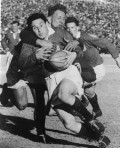|
In 1955 the British Lions toured South Africa under the vice captaincy of Angus Cameron Scott Cameron's great uncle
On their return Cliff Morgan brought a Lions Select Xv to play a Combinded Accies/HSFP team at Old Anniesland
BBC takes up
Wales rugby international and broadcaster Cliff Morgan has died after a long illness aged 83.
Morgan was one of the most talented fly-halves in the game, before becoming a respected commentator, writer and head of BBC outside broadcasts.
He won 29 caps for Wales, his first in 1951, captained the British and Irish Lions and also played for Cardiff.
Morgan will be forever associated with his commentary on the Barbarians v All Blacks match in 1973.
He is particularly remembered for his description of Gareth Edwards's famous try: "Brilliant by Quinnell. This is Gareth Edwards; a dramatic start. What a score!"
Play media
Cliff Morgan commentates on Gareth Edwards's try for the Barbarians
His easy-going charm and passionate love of sport was familiar to both rugby supporters and radio and television audiences.
He enjoyed a successful career as a mercurial fly-half for Cardiff, Wales, the Barbarians and the Lions before finding a new career in broadcasting.
Clifford Isaac Morgan was born on 7 April 1930 in the village of Trebanog in the heart of the Rhondda.
The son of a coal miner who turned down an offer to play for Tottenham Hotspur, the young Cliff combined a love of singing and woodwork with a burgeoning ability on the rugby pitch.
His rugby master played the young Morgan at every position from prop to wing, before allowing him to excel at fly-half, a role which could have been created for him.
Short, slightly stocky and with an innate sense of balance, Cliff Morgan cut through opposition defences, often cheekily showing the other sides' players the ball before darting away and passing it.
Aged 19, he was picked to play for Cardiff and proved to be an inspirational presence who, within a year, won the first of 29 caps for his country.
He was a pivotal member of the Grand Slam-winning team of 1952, more than holding his own alongside giants of the game like Bleddyn Williams and Ken Jones.
The following year, Morgan inspired first Cardiff, and then Wales, to victory against the mighty New Zealand All Blacks.
In 1955, he dazzled for the Lions on their tour of South Africa, scoring a crucial try against the Springboks in Johannesburg.
The Lions' 23-22 victory, in front of a crowd of 96,000 in the rarefied air of the Transvaal, was considered by Morgan to have been the greatest day of his sporting life.
Three years later, he retired from rugby at just 28, leaving behind many memories and admirers.
He moved effortlessly from player to broadcaster, first with the BBC in Wales before making the move to London.
If anything, his broadcasting career eclipsed his efforts on the rugby field. As editor of Grandstand and head of outside broadcasts, he helped define the way the corporation covered major sporting events.
To the surprise of many of his colleagues, he quit the BBC to edit This Week, the successful current affairs programme on ITV.
A stroke in 1972 left Morgan speechless and paralysed down one side, but he completed a remarkable recovery when, having returned to the BBC, he commentated on the legendary 1973 match between the Barbarians and the All Blacks at Cardiff Arms Park.
As Gareth Edwards crashed over for 'that try', Morgan's commentary rose magnificently to the occasion: "If the greatest writer of the written word would have written that story, you'd never have believed it."
Ironically it was rugby's other great voice, that of the late Bill McLaren, which should have told the story of the try, but the Scot was forced to withdraw with flu on the morning of the game.
In many ways it was fitting that Morgan should have been in the commentator's seat. A true Barbarian, he played in the famous black and white shirt before ever being picked for Wales and his view of how sport should be played reflected the amateur ethos.
He was uncomfortable with the flood of money going into sport and openly criticised those players who came to the game with a win-at-all-costs mentality.
A spell as resident captain on A Question of Sport was followed by what for many was his crowning achievement, the 11 years behind the microphone on Sport on 4.
For many Radio 4 listeners, the weekend had not properly begun until they had tuned in to Morgan's perceptive take on the sporting world, delivered in what fellow presenter Des Lynam described as "one of the best broadcasting voices of all time".
In 2007 he received a lifetime achievement award from BBC Wales and a tribute from fellow Barbarian, Tony O'Reilly.
"He's a man apart because of his gaiety, his grandeur, eloquence, because of his skills as a football player and his generosity to other players, which was enormous," said O'Reilly.
This article was posted on 29-Aug-2013, 10:26 by Hugh Barrow.
|


Angus Cameron middle row with Cliff Morgan
|









